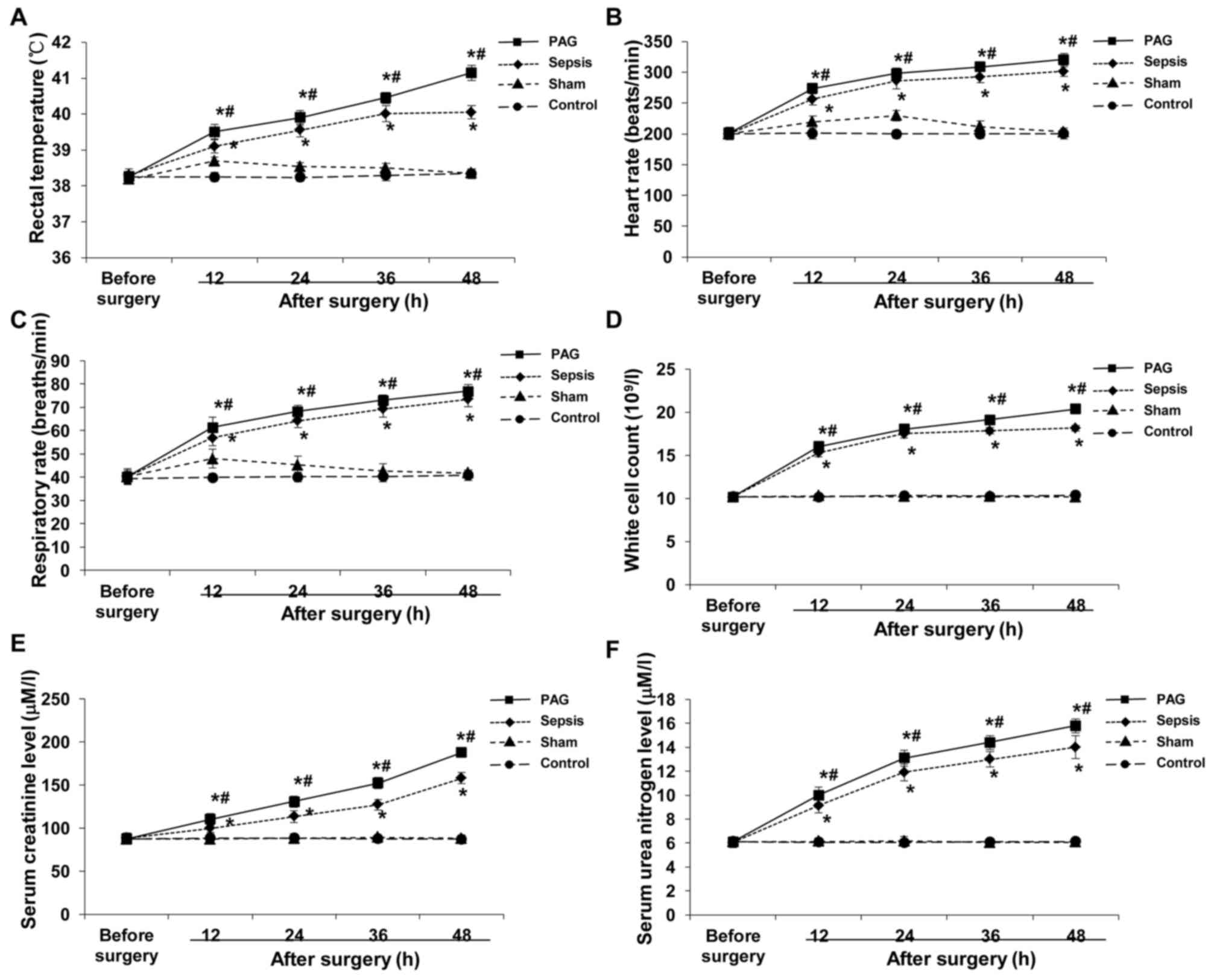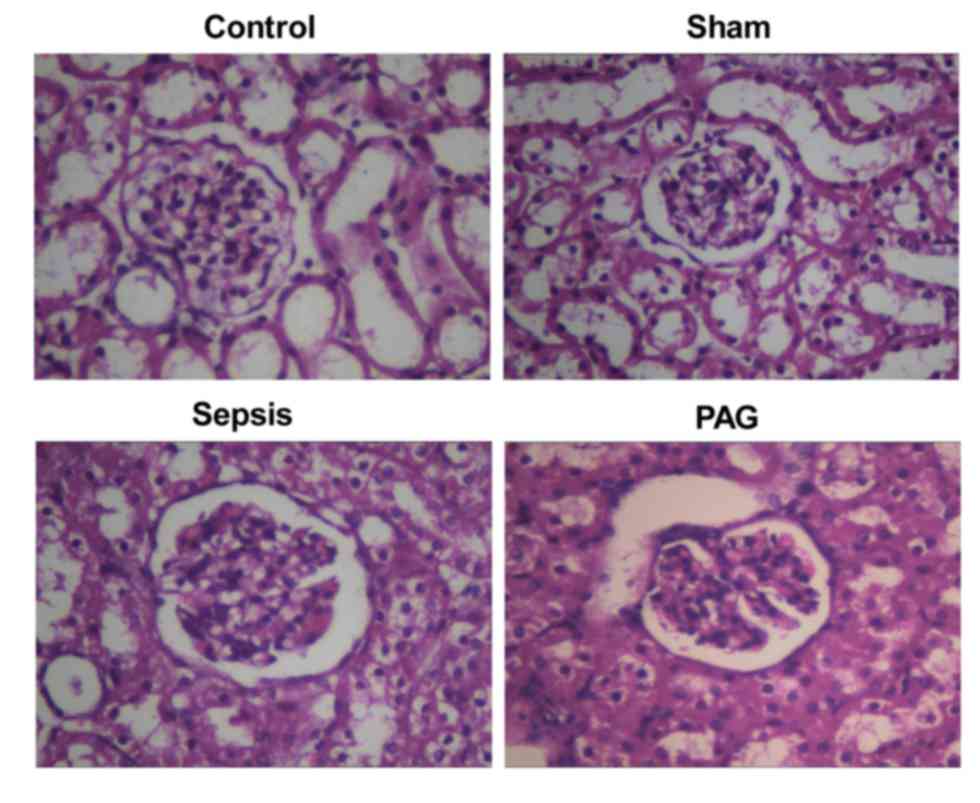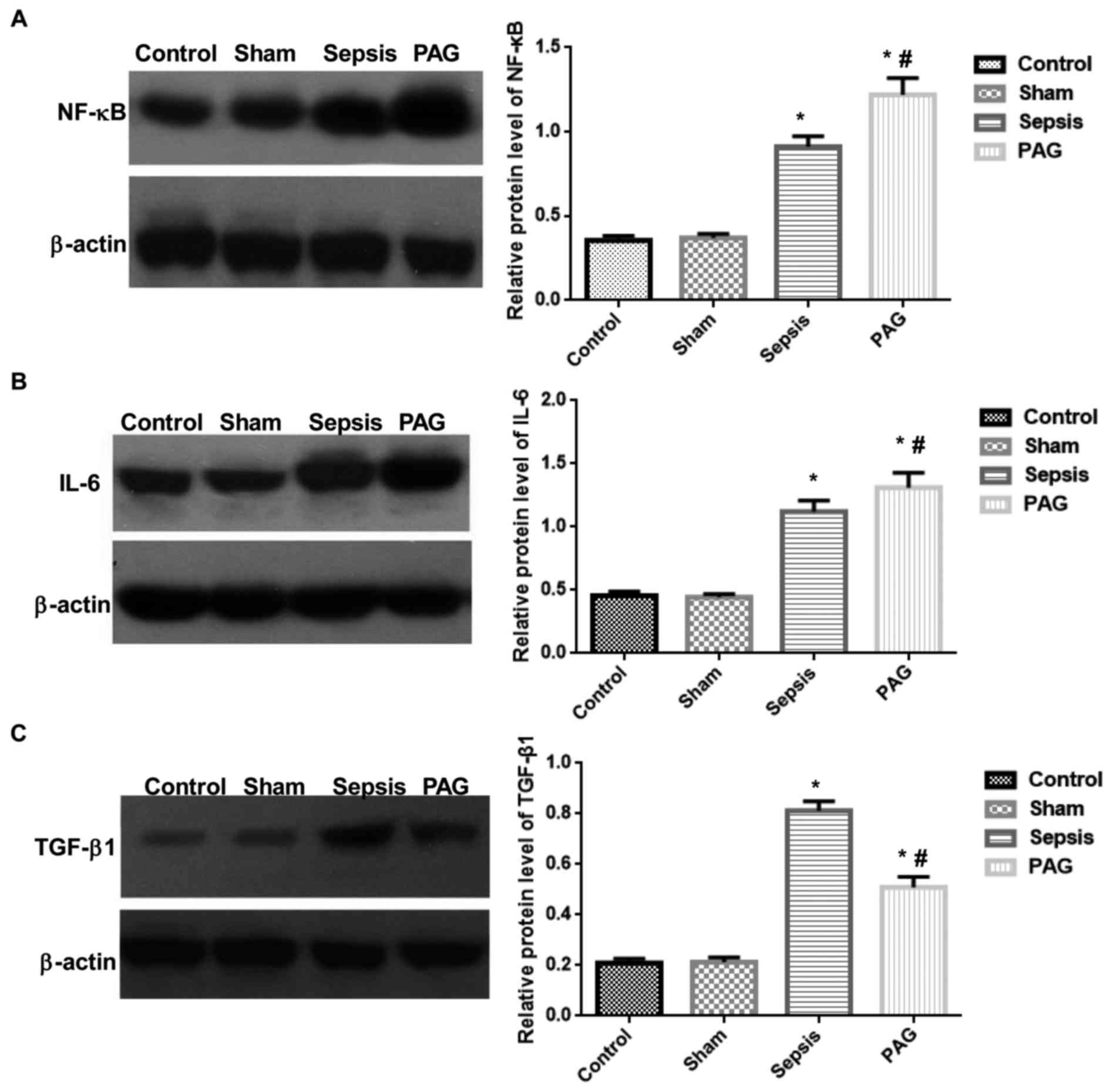|
1
|
Stevenson EK, Rubenstein AR, Radin GT,
Wiener RS and Walkey AJ: Two decades of mortality trends among
patients with severe sepsis: A comparative meta-analysis. Crit Care
Med. 42:625–631. 2014. View Article : Google Scholar : PubMed/NCBI
|
|
2
|
Levy MM, Dellinger RP, Townsend SR,
Linde-Zwirble WT, Marshall JC, Bion J, Schorr C, Artigas A, Ramsay
G, Beale R, et al: The Surviving Sepsis Campaign: Results of an
international guideline-based performance improvement program
targeting severe sepsis. Crit Care Med. 38:367–374. 2010.
View Article : Google Scholar : PubMed/NCBI
|
|
3
|
Martin GS, Mannino DM, Eaton S and Moss M:
The epidemiology of sepsis in the United States from 1979 through
2000. N Engl J Med. 348:1546–1554. 2003. View Article : Google Scholar : PubMed/NCBI
|
|
4
|
Cawcutt KA and Peters SG: Severe sepsis
and septic shock: Clinical overview and update on management. Mayo
Clin Proc. 89:1572–1578. 2014. View Article : Google Scholar : PubMed/NCBI
|
|
5
|
Grabe M, Bjerklund-Johansen TE, Botto H,
Çek M, Naber KG, Pickard RS, Tenke P, Wagenlehner F and Wullt B:
Guidelines on urological infectionsEuropean Association of Urology.
Arnhem: 2013, https://uroweb.org/wp-content/uploads/18_Urological-infections_LR.pdfLimited
Update March 2013. PubMed/NCBI
|
|
6
|
Fry DE: Sepsis, systemic inflammatory
response, and multiple organ dysfunction: The mystery continues. Am
Surg. 78:1–8. 2012.PubMed/NCBI
|
|
7
|
Makkonen J, Pietilainen KH, Rissanen A,
Kaprio J and Yki-Jarvinen H: Genetic factors contribute to
variation in serum alanine aminotransferase activity independent of
obesity and alcohol: A study in monozygotic and dizygotic twins. J
Hepatol. 50:1035–1042. 2009. View Article : Google Scholar : PubMed/NCBI
|
|
8
|
Zhou CF and Tang XQ: Hydrogen sulfide and
nervous system regulation. Chin Med J (Engl). 124:3576–3582.
2011.PubMed/NCBI
|
|
9
|
Wang R: Hydrogen sulfide: The third
gasotransmitter in biology and medicine. Antioxid Redox Signal.
12:1061–1064. 2010. View Article : Google Scholar : PubMed/NCBI
|
|
10
|
Kimura H: Hydrogen sulfide: Its
production, release and functions. Amino Acids. 41:113–121. 2011.
View Article : Google Scholar : PubMed/NCBI
|
|
11
|
Whiteman M and Winyard PG: Hydrogen
sulfide and inflammation: The good, the bad, the ugly and the
promising. Expert Rev Clin Pharmacol. 4:13–32. 2011. View Article : Google Scholar : PubMed/NCBI
|
|
12
|
Calvert JW, Coetzee WA and Lefer DJ: Novel
insights into hydrogen sulfide-mediated cytoprotection. Antioxid
Redox Signal. 12:1203–1217. 2010. View Article : Google Scholar : PubMed/NCBI
|
|
13
|
Lobb I, Sonke E, Aboalsamh G and Sener A:
Hydrogen sulphide and the kidney: Important roles in renal
physiology and pathogenesis and treatment of kidney injury and
disease. Nitric Oxide. 46:55–65. 2015. View Article : Google Scholar : PubMed/NCBI
|
|
14
|
Koning AM, Frenay AR, Leuvenink HG and van
Goor H: Hydrogen sulfide in renal physiology, disease and
transplantation-the smell of renal protection. Nitric Oxide.
46:37–49. 2015. View Article : Google Scholar : PubMed/NCBI
|
|
15
|
Tokuda K, Kida K, Marutani E, Crimi E,
Bougaki M, Khatri A, Kimura H and Ichinose F: Inhaled hydrogen
sulfide prevents endotoxin-induced systemic inflammation and
improves survival by altering sulfide metabolism in mice. Antioxid
Redox Signal. 17:11–21. 2012. View Article : Google Scholar : PubMed/NCBI
|
|
16
|
Zhang P, Li F, Wiegman CH, Zhang M, Hong
Y, Gong J, Chang Y, Zhang JJ, Adcock I, Chung KF and Zhou X:
Inhibitory effect of hydrogen sulfide on ozone-induced airway
inflammation, oxidative stress, and bronchial hyperresponsiveness.
Am J Respir Cell Mol Biol. 52:129–137. 2015. View Article : Google Scholar : PubMed/NCBI
|
|
17
|
Pan LL, Liu XH, Gong QH, Wu D and Zhu YZ:
Hydrogen sulfide attenuated tumor necrosis factor-alpha-induced
inflammatory signaling and dysfunction in vascular endothelial
cells. PLoS One. 6:e197662011. View Article : Google Scholar : PubMed/NCBI
|
|
18
|
Zuidema MY, Peyton KJ, Fay WP, Durante W
and Korthuis RJ: Antecedent hydrogen sulfide elicits an
anti-inflammatory phenotype in postischemic murine small intestine:
Role of heme oxygenase-1. Am J Physiol Heart Circ Physiol.
301:H888–894. 2011. View Article : Google Scholar : PubMed/NCBI
|
|
19
|
Spiller F, Orrico MI, Nascimento DC,
Czaikoski PG, Souto FO, Alves-Filho JC, Freitas A, Carlos D,
Montenegro MF, Neto AF, et al: Hydrogen sulfide improves neutrophil
migration and survival in sepsis via K+ATP channel activation. Am J
Respir Crit Care Med. 182:360–368. 2010. View Article : Google Scholar : PubMed/NCBI
|
|
20
|
Ang SF, Sio SW, Moochhala SM, MacAry PA
and Bhatia M: Hydrogen sulfide upregulates cyclooxygenase-2 and
prostaglandin E metabolite in sepsis-evoked acute lung injury via
transient receptor potential vanilloid type 1 channel activation. J
Immunol. 187:4778–4787. 2011. View Article : Google Scholar : PubMed/NCBI
|
|
21
|
Chen X, Xu W, Wang Y, Luo H, Quan S, Zhou
J, Yang N, Zhang T, Wu L, Liu J, et al: Hydrogen sulfide reduces
kidney injury due to urinary-derived sepsis by inhibiting NF-kappaB
expression, decreasing TNF-alpha levels and increasing IL-10
levels. Exp Ther Med. 8:464–470. 2014. View Article : Google Scholar : PubMed/NCBI
|
|
22
|
Yao Y, Sheng Z and Lin H: New
understanding of the definition and diagnosis of sepsis. Zhongguo
Wei Zhong Bing Ji Jiu Yi Xue. 16:321–324. 2004.PubMed/NCBI
|
|
23
|
Souza AC, Volpini RA, Shimizu MH, Sanches
TR, Camara NO, Semedo P, Rodrigues CE, Seguro AC and Andrade L:
Erythropoietin prevents sepsis-related acute kidney injury in rats
by inhibiting nuclear-factor kappa B and upregulating endothelial
nitric oxide synthase. Am J Physiol Renal Physiol. 302:1045–1054.
2012. View Article : Google Scholar
|
|
24
|
Xu H, Ye X, Steinberg H and Liu SF:
Selective blockade of endothelial NF-kappaB pathway differentially
affects systemic inflammation and multiple organ dysfunction and
injury in septic mice. J Pathol. 220:490–498. 2010.PubMed/NCBI
|
|
25
|
Sadik NA, Mohamed WA and Ahmed MI: The
association of receptor of advanced glycated end products and
inflammatory mediators contributes to endothelial dysfunction in a
prospective study of acute kidney injury patients with sepsis. Mol
Cell Biochem. 359:73–81. 2012. View Article : Google Scholar : PubMed/NCBI
|
|
26
|
Peri F, Piazza M, Calabrese V, Damore G
and Cighetti R: Exploring the LPS/TLR4 signal pathway with small
molecules. Biochem Soc Tran. 38:1390–1395. 2010. View Article : Google Scholar
|
|
27
|
Peri F, Piazza M, Calabrese V, Damore G
and Cighetti R: Exploring the LPS/TLR4 signal pathway with small
molecules. Biochem Soc Trans. 38:1390–1395. 2010. View Article : Google Scholar : PubMed/NCBI
|
|
28
|
Kim TH, Yoon SJ and Lee SM: Genipin
attenuates sepsis by inhibiting toll-like receptor signaling. Mol
Med. 18:455–465. 2012. View Article : Google Scholar : PubMed/NCBI
|
|
29
|
Thome M, Hofmann K, Burns K, Martinon F,
Bodmer JL, Mattmann C and Tschopp J: Identification of CARDIAK, a
RIP-like kinase that associates with caspase-1. Curr Biol.
8:885–888. 1998. View Article : Google Scholar : PubMed/NCBI
|
|
30
|
Liu Z, Guan Y, Sun X, Shi L, Liang R, Lv X
and Xin W: HSV-1 activates NF-kappaB in mouse astrocytes and
increases TNF-alpha and IL-6 expression via Toll-like receptor 3.
Neurol Res. 35:755–762. 2013. View Article : Google Scholar : PubMed/NCBI
|
|
31
|
Sagy M, Al-Qaqaa Y and Kim P: Definitions
and pathophysiology of sepsis. Curr Probl Pediatr Adolesc Health
Care. 43:260–263. 2013. View Article : Google Scholar : PubMed/NCBI
|
|
32
|
Mudter J and Neurath MF: Il-6 signaling in
inflammatory bowel disease: pathophysiological role and clinical
relevance. Inflamm Bowel Dis. 13:1016–1023. 2007. View Article : Google Scholar : PubMed/NCBI
|
|
33
|
Tambuyzer T, De Waele T, Chiers K,
Berckmans D, Goddeeris BM and Aerts JM: Interleukin-6 dynamics as a
basis for an early-warning monitor for sepsis and inflammation in
individual pigs. Res Vet Sci. 96:460–463. 2014. View Article : Google Scholar : PubMed/NCBI
|
|
34
|
Hiraki S, Ono S, Tsujimoto H, Kinoshita M,
Takahata R, Miyazaki H, Saitoh D and Hase K: Neutralization of
interleukin-10 or transforming growth factor-beta decreases the
percentages of CD4+ CD25+ Foxp3+ regulatory T cells in septic mice,
thereby leading to an improved survival. Surgery. 151:313–322.
2012. View Article : Google Scholar : PubMed/NCBI
|
|
35
|
McCartney-Francis N, Jin W and Wahl SM:
Aberrant toll receptor expression and endotoxin hypersensitivity in
mice lacking a functional TGF-beta 1 signaling pathway. J Immunol.
172:3814–3821. 2004. View Article : Google Scholar : PubMed/NCBI
|
|
36
|
Kimura H, Shibuya N and Kimura Y: Hydrogen
sulfide is a signaling molecule and a cytoprotectant. Antioxid
Redox Signal. 17:45–57. 2012. View Article : Google Scholar : PubMed/NCBI
|
|
37
|
Yang C, Yang Z, Zhang M, Dong Q, Wang X,
Lan A, Zeng F, Chen P, Wang C and Feng J: Hydrogen sulfide protects
against chemical hypoxia-induced cytotoxicity and inflammation in
HaCaT cells through inhibition of ROS/NF-κB/COX-2 pathway. Plos
One. 6:e219712011. View Article : Google Scholar : PubMed/NCBI
|
|
38
|
Ma B, Liang G, Zhang F, Chen Y and Zhang
H: Effect of hydrogen sulfide on restenosis of peripheral arteries
after angioplasty. Mol Med Rep. 5:1497–1502. 2012.PubMed/NCBI
|


















